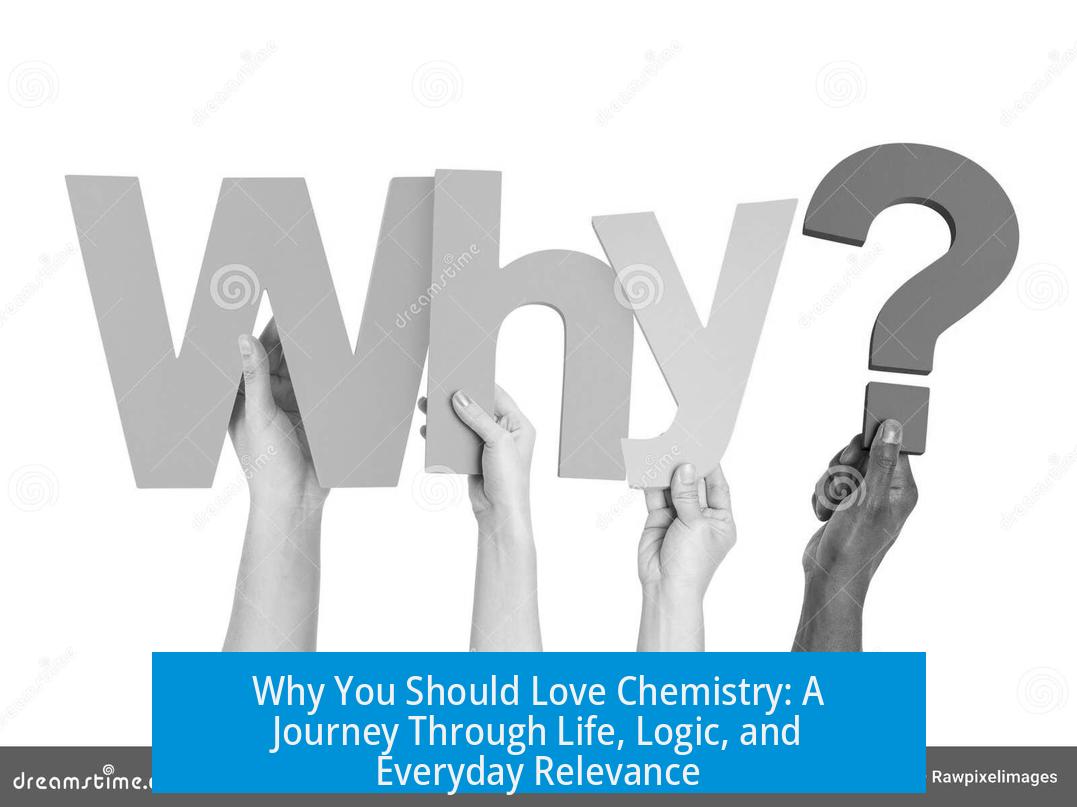Why Do You Love Chemistry?

Chemistry captivates because it reveals the fundamental nature of matter and life through logical patterns, creative manipulation, and practical applications. It provides a deep understanding of how substances interact, change, and form the complexities we observe daily. The fascination lies not only in theoretical knowledge but in hands-on experimentation and solving challenging puzzles. This article explores why chemistry inspires passion and curiosity, highlighting its unique position among sciences and its relevance to life.
Chemistry as a Deep Understanding of Life and Matter
Chemistry studies matter—the “stuff” that makes up everything around us. It examines atoms and how electrons move and bond. This deep insight helps us understand life’s origins and material structures without delving too much into broader physics. Chemistry acts as a bridge between the physical sciences and biological complexity.
- At the core is electron behavior—how electrons transfer between atoms to create new substances.
- This knowledge enables innovation in materials for computers, batteries, medicines, and environmental cleanup.
- Chemistry explains biological processes, such as addiction via dopamine interactions in the brain.
- It addresses toxicology by understanding harmful minerals and compounds.
- Overall, chemistry is central to life as known, studied, and evolving.
Chemistry’s foundation lies just a step beyond physics. It offers analytical methods unlike the broad scope of biology, positioning itself as an essential tool to decipher natural puzzles.
Chemistry as Puzzle Solving and Logical Challenge
Chemistry often feels like decoding an intricate logic puzzle. Its rules form predictable trends and decision trees. Mastery of basic principles leads to clarity and an interconnected understanding of matter.
- Chemistry puzzles range from simple molecular formulas to complex organic reactions.
- Many chemists enjoy continuous problem-solving, finding it mentally stimulating.
- The periodic table itself is a sophisticated tool that organizes elemental properties—a genius system that unfolds logic and connections.
- Each chemical problem builds upon previous knowledge and fits into a cohesive framework.
This logical appeal attracts individuals driven to solve puzzles. Chemistry exercises reasoning skills similar to strategy games and brain teasers, extending to real-world experiments.
Chemistry as Creative Manipulation and Magic
Chemistry offers a rare blend of creativity and explanation. It allows controlled rearrangements of matter, creating new materials with novel properties. This manipulation often appears magical but rests on scientific principles.
- Chemists transform substances into medicines, catalysts, and innovative compounds.
- It reflects the ancient dreams of alchemy, now realized through rational modification.
- The ability to observe and change matter unseen by the naked eye feels like modern sorcery.
- Reactions that alter color, shape, or state illustrate swift and tangible changes.
Chemistry’s magic derives from understanding—combining the ability to break down substances and rebuild them purposefully. This mix of control and wonder hooks many enthusiasts.
Passion for Specific Chemistry Fields and Properties
Interest in chemistry often narrows into specializations based on preferred phenomena or applications.
| Field | Appealing Aspects |
|---|---|
| Inorganic Chemistry | Vibrant colors of salts and transition metal reactions |
| Organic Chemistry | Intuitive reaction mechanisms and complex synthesis puzzles |
| Pharmaceutical Chemistry | Turning poisons into medicines by tweaking molecular structures |
| Materials Chemistry | Creating advanced materials like batteries and catalysts |
Chemistry’s diversity offers pathways for visual interest, intellectual challenge, and tangible societal impact. Some focus on metals and minerals for their aesthetics and intricate properties. Others are drawn to medicinal compounds due to their direct human relevance.
Chemistry as Emotional and Social Experience
Chemistry connects emotionally and socializes through shared passion. Achieving success in experiments brings pleasure, often rare and rewarding.
- The cycle of design, testing, failure, and eventual success fuels motivation.
- Chemistry communities tend to be intelligent and engaging, making social interactions lively.
- The subject offers warmth and vibrancy, providing comfort rather than existential questioning.
- Many feel nostalgia and satisfaction linked to exposure from early education or family influence.
For some, chemistry is a lifelong companion and a source of intellectual joy outside career ambitions. Others find it comforting through pharmacology or its explanatory power over everyday phenomena.
Chemistry’s Practical and Everyday Relevance
Chemistry influences daily life in direct and subtle ways, making it valuable and interesting.
- Cooking exemplifies applied chemistry—synthesis resembles culinary processes.
- Knowledge of ingredients demystifies labels and food additives.
- Experiments such as measuring energy in foods enhance engagement and comprehension.
- It equips scientists to gather precise data using advanced technologies, contributing to a global web of scientific effort.
This practical aspect nurtures appreciation by linking classroom concepts to familiar experiences and challenges.
Chemistry as Fascination with Reactions, Danger, and Exploration
The subject attracts those curious about the energetic and sometimes hazardous side of chemistry.
- Exploring reactions with acids, carcinogens, and metals draws interest based on danger and unpredictability.
- The spectacle of explosions or fire sparks excitement and engagement.
- Chemistry reveals detailed mechanisms behind dramatic changes in small quantities of matter.
- Some embrace the challenge because few others dare tackle difficult or risky tasks.
This element of adventure appeals to experimental minds eager to observe nature’s extremes safely and systematically.
Personal and Lifelong Relationship with Chemistry
Chemistry inspires profound personal stories and lifelong commitments.
- Some develop an early bond through books or home labs, fostering curiosity from childhood.
- It remains a pinnacle interest, prioritized for intellectual fulfillment rather than just career motives.
- Many pursue ongoing self-study beyond formal education for curiosity’s sake.
- The endless unknowns and evolving frontiers in chemistry keep it perpetually exciting.
These personal connections emphasize chemistry’s role beyond academics—as a continual source of wonder and discovery throughout life.
Chemistry as a Lens to Understand the World and Self
Chemistry offers a unique perspective to explore existence and personal meaning.
- It explains sensory experiences like color, taste, and emotion through molecular interactions.
- The principles align with universal behaviors, such as energy minimization and system equilibrium.
- Applying chemical logic to everyday problems provides fresh insights and distractions.
- This lens extends to relationships, careers, and life’s challenges, making it broad and relevant.
Chemistry reminds us that we and our environment are connected through fundamental atomic and molecular principles, offering a coherent worldview.
Key Takeaways
- Chemistry reveals the structure and behavior of matter, vital for understanding life.
- Logical principles make chemistry a satisfying puzzle and intellectual challenge.
- Creative manipulation of substances gives chemistry a “magical” power grounded in reason.
- Specialized fields provide diverse interests from colors to drug design.
- Emotional highs and social bonds enrich the chemistry experience.
- Daily relevance ties chemistry to cooking, health, and technology.
- Fascination with reactive and hazardous substances fuels exploration.
- Many develop a lifelong passion starting in early life or personal curiosity.
- Chemistry reveals fundamental truths about the universe and ourselves.





Leave a Comment